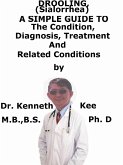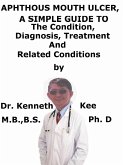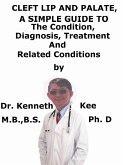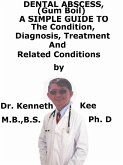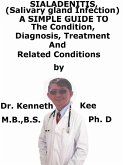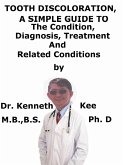This book describes Dry Mouth (Xerostomia), Diagnosis and Treatment and Related Diseases Recently I saw a patient who complained of dryness of the mouth all the time. I told him that was because he was breathing through his mouth. He should be always breathing through his nose. Dry mouth also termed xerostomia is a medical disorder in which the mouth is abnormally dry. It happens when salivary glands in the mouth do not produce sufficient saliva. This disorder produces a parched, or dry, feeling in the mouth. It can also produce other symptoms, such as bad breath, a dry throat, and cracked lips. Saliva, or spit, is produced by the salivary glands and is very central component for a healthy mouth. It moisturizes the mouth and washes away food particles from the teeth and gums, and helps people with swallowing. Also, the saliva has minerals such as calcium and phosphate that help maintain the teeth strength and battle tooth decay. Saliva contains such antibacterial agents as secretory IgA, lactoferrin, lysozyme and peroxidase that help to prevent infection by regulating the bacteria and fungi in the mouth. When the patient does not make sufficient saliva, the mouth becomes dry and uncomfortable. Dry mouth is not a serious medical disorder on its own. It is occasionally a symptom of another underlying medical disorder that requires treatment. It can also cause complications like tooth decay. Patients are susceptible to more frequent incidence of dental caries, periodontal disease, oral infections (particularly candidiasis) and intolerance of dentures. Dry mouth often results from dehydration. Disorders that cause dehydration, such as fever, excessive sweating, vomiting, diarrhea, blood loss, and burns can produce dry mouth. Some disorders, such as diabetes, can also affect the saliva production and produce dry mouth. Surgical removal of the salivary glands affects the production of saliva inducing dry mouth. Dry mouth can be a consequence of certain health disorders, such as the autoimmune disease Sjogren's syndrome or HIV/AIDS. Stroke and Alzheimer's disease may provide a perception of dry mouth, even though the salivary glands are working normally. Some of these disorders are: 1. Diabetes 2. Oral thrush (yeast infection in the mouth) 3. Alzheimer's disease 4. Cystic fibrosis 5. HIV and AIDS 6. Sjogren's syndrome 7. Anemia 8. Rheumatoid arthritis 9. Mumps More than 400 medicines including over-the-counter drugs produce dry mouth as a side effect. The more likely forms of medicines to cause dry mouth are some of the drugs used to treat: 1. Depression, 2. Nerve pain 3. Anxiety 4. Some antihistamines, decongestants, 5. Muscle relaxants and 6. Pain medicines. Dry mouth is a frequent side effect of many prescription and nonprescription drugs, such as drugs used to treat obesity, acne, epilepsy, hypertension (diuretics, ACE inhibitors), diarrhea, nausea, psychotic disorders, urinary incontinence, asthma (certain bronchodilators), and Parkinson's disease. The doctor or dentist will review the medical history and ask about any medicines the patient take. He or she may also request blood tests or a test that measures how much saliva the patient produce. Sialometry: The normal stimulated salivary flow rate is normally between 1.5 to -2.0 mL/min, while the un-stimulated flow rate varies from 0.3 to 0.4 mL/min. A diagnosis of hyposalivation is made if stimulated salivary flow is less than 0.5 to 0.7 mL/min or un-stimulated flow of under 0.1 mL/min. Dry mouth is normally a temporary and treatable disorder. The patient must keep hydrated and learn to breathe through the nose, not the mouth....
Dieser Download kann aus rechtlichen Gründen nur mit Rechnungsadresse in A, B, CY, CZ, D, DK, EW, E, FIN, F, GR, H, IRL, I, LT, L, LR, M, NL, PL, P, R, S, SLO, SK ausgeliefert werden.



